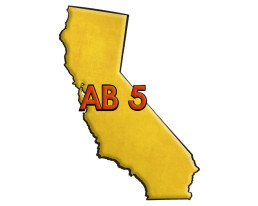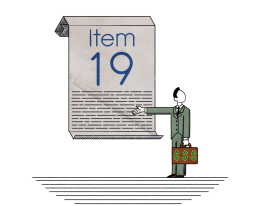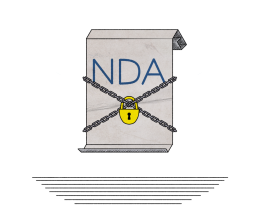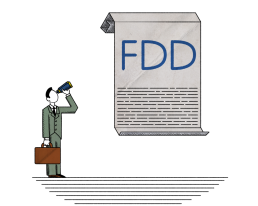California’s Assembly Bill No. 5 Affects Franchising
Many franchisors are wondering what changes they should make in response to California’s AB-5 that went into effect on January 1, 2020. In a nutshell, we don’t think it makes sense to make any significant changes to a franchise system because the applicability of AB-5 to franchisors isn’t fully determined, and there will likely be changes to this law in 2020.
The purpose of AB-5 is to crack down on companies like Uber and Lyft that treat their employees as independent contractors when they should (according to California) be treated as employees. California wants to be able to collect taxes and unemployment contributions, and they want to be sure employees receive benefits, overtime, and minimum wages.
What does this mean for franchise systems in California? Franchises are not specifically mentioned in the bill, but currently they are also not exempted from it. So, in theory, unless a franchisor can show that its franchisees meet certain conditions, the franchisor would have to treat its California franchisees as employees and pay employment taxes and provide certain benefits. However, the issue is far from settled, and most franchise attorneys agree that making any changes in response to AB-5 now would be premature. Our understanding is California intends to modify the law in 2020, and the author of the law, Lorene Gonzales, recently tweeted, “AB-5 is not intended to interfere with independent businesses.”
The new law assumes anyone compensated for labor or services is an employee. In order to be exempt from this, a hiring entity (potentially a franchisor) must satisfy all three parts of the AB-5 test:
(1) Show that the person is free from the control and direction of the hiring entity, on paper and in practice. This is similar to the joint-employer concerns that have been on the radar for several years already. Most franchisors can overcome this requirement through use of targeted language in the FDD, franchise agreement, operations manual, and standard operating procedures;
(2) Show that the person performs work that is outside the usual course of the hiring entity’s business. This part of the test could be more difficult for a franchisor to overcome, especially if there are company-owned outlets or the franchisor advertises that the “company” (by use of general references to the system name) provides certain services; and
(3) Show that the person customarily operates independently through a business, occupation, or trade that is the same nature as the work performed. Franchisors would need to show that their franchisees are customarily involved in the same industry (for example, a plumber who purchases a plumbing franchise).
Another factor that may help a franchisor steer clear of AB-5 is to avoid using any structure that makes franchisees look like employees. We recommend you:
-
Ensure franchisees use a business entity to operate the franchise;
-
Require franchisees to hire employees to avoid a situation where a franchisee is the sole employee of the franchise; and
-
Avoid any structure that could be interpreted as a system where a payment is made from the franchisor to franchisees for services performed.
Every franchise system is unique, and it would take a case-by-case evaluation to judge whether a system's franchisees could fall within the scope of the law. For the time being, we expect there to be changes to the law in 2020, and there are ongoing lobbying efforts to revise the bill’s definition of “employer” or include a statutory exemption for franchises.
Update: On November 16, 2020, the International Franchise Association (IFA) and others filed a lawsuit against California to stop the state from enforcing AB-5 against franchises. They argue the law “fails to take into account the basis of our basic business model.” This case is currently pending in federal court in the Southern District of California.
Also, several ride-share and food delivery companies, including Uber, Lyft, and DoorDash scored a win on election day when Proposition 22 passed, allowing them to continue treating employees as independent contractors. Ironically, this means the very companies that were the target of AB-5 are now essentially exempt from the law. Unfortunately for the franchise industry, franchises are still potentially subject to the law and will have to wait for the litigation to play out to get more clarity.
Our team will keep researching this issue as it unfolds. If you want to talk to a franchise attorney about these issues, please contact us.
Item 19 Financial Performance Representations & COVID
You’ve probably heard the phrase, “COVID ruined everything” more than once. And unfortunately, we’re here to tell you the same likely applies for Item 19 financial performance representations (FPRs).
Any operating results presented in Item 19 must have a reasonable basis and cannot be misleading. If COVID has caused (1) a drop in revenue, (2) temporary or permanent store closures or (3) changes to the business model/operations, then presenting 2019 or earlier financial data may no longer have a reasonable basis and might be misleading. This means the FPR will most likely be rejected by franchise state examiners and may result in franchisee litigation in the future.
Drop in Revenue
Issue: If franchisees’ revenue during periods impacted by COVID is lower, it may be misleading to show only the results from operations when revenue wasn’t impacted by COVID.
Solution: Include operating results during period impacted by COVID. The registration states have universally approved including data that compares monthly revenues prior to 2020 to periods impacted by COVID. This data should cover time periods impacted by COVID and should include the same reporting group that is used for any data already presented. This disclosure allows prospective franchisees to make their own judgements about how the pandemic may impact operating results.
Temporary/Permanent Closures
Issue: If franchised businesses temporarily closed during the pandemic or went out of business, it may be misleading to show only the results from a period when franchised businesses were operating full-time or before they permanently closed.
Solution: Include closure data in the Item 19. In addition to including a year-over-year comparison (see above), the Item 19 should be updated with information on temporary and permanent closures. This information can be included in an introduction or footnote and should provide details on when franchised businesses closed and re-opened—or when they closed permanently—and the number of franchised businesses affected. Any financial data should include the operating results of the franchised businesses that temporarily or permanently closed (i.e. revenue would be reduced or equal to $0 for those franchised businesses).
Changes to Operations
Issue: If franchised businesses had a shift in their business model or operations (e.g. a dine-in only concept that begins offering delivery or adds drive-thru), it may be misleading to show only results from a period before operations changed.
Solution: Re-draft or remove Item 19. If changes to operations are significant enough, then there is likely no reasonable basis for including results prior to the pandemic (e.g. you can’t use operating results from franchised businesses that don’t operate a business that is “substantially similar” to the franchise being sold). If the changes are minor, then at a minimum these changes to operations should be described in the Item 19.
Cautionary Note for Using Different Item 19s
Keep in mind that if a franchisor revises or removes an FPR in one state, it’s risky to keep using the existing FPR in other states. The Federal Trade Commission suggests that any Item 19 changes made to comply with one state’s requirements must also be reflected in every other state (https://www.ftc.gov/tips-advice/business-center/guidance/amended-franchise-rule-faqs#38). For this reason, we generally recommend franchisors always use the same Item 19 in all states.
Be sure to see our blog on FPRs at https://drummlaw.com/blog/financial-performance-representation/.
Should I Have an Item 19 in my FDD?
When I get asked this question, I respond as follows:
“The FDD has 23 Items. If there were just one Item in the Franchise Disclosure Document (FDD) you could look in deciding whether or not to buy a franchise, which Item would it be? I don’t care what it is, how much it costs, I need to know if it makes money.”
FDDs tend to be packed with information and details, and prospective franchisees often review several FDDs before making their decision. But in reality, most franchisees are looking for one thing: a franchise that will bring a good return on their investment. This is why most prospective franchisees would say that Item 19 is the most important Item in the FDD: if the Item 19 does not pass the test, none of the other items are relevant.
This is one reason why presenting a FPR in a fair and accurate manner is vital. Item 19 tends to be high risk from a litigation standpoint, and should a franchisee become unhappy with the franchise relationship, its attorney will likely try to pick apart the Item 19 to find anything unreasonable or misleading.
In 2018, NASAA created a commentary that raised the bar for Item 19 representations. You can access the complete NASAA Commentary at http://nasaa.cdn.s3.amazonaws.com/wp-content/uploads/2017/05/Financial-Performance-Representation-Commentary.pdf. Here are some of the most important new requirements:
Newly Required Definitions
-
Gross Sales: If the FPR uses gross sales or a similar term (e.g. gross revenues) you must also include a definition of the term and disclose which items, if any, you are deducting from the total revenue, including sales tax, discounts, allowances, and returns.
-
Net Income: If the FPR uses net income or a similar term (e.g. net profit) you must also include a definition of the term and disclose which items you are deducting from gross profit, including ordinary and recurring operating expenses, interest, income taxes, depreciation, and amortization.
Using Averages and Medians
-
Whenever you disclose an average of any numbers in the FPR, you also must disclose the median of those numbers because the existence of outliers may skew an average, thereby making it misleading (even if the calculation is accurate).
-
Whenever you disclose the average of gross sales, you also must disclose the highest and lowest numbers in the range.
Imputing Franchisee Costs on Company-Owned Outlets
-
In a FPR disclosing net profit for a company- or affiliate-owned outlet, you must adjust or supplement the FPR to include imputed royalties, advertising fund contributions, and other fees not paid by these outlets.
-
The disclosure of these differences must be clearly presented and in the same format as the rest of the FPR. For example, if the FPR presents data in a table, the differences must be adjusted within or added to the end of the table.
-
Imputing costs in this way may constitute a financial projection using historical data. We recommend you include a disclosure regarding the bases and assumptions relied upon as a part of the notes to the FPR tables.
Including Company-Owned Data when Operational Franchises Exist
-
Generally, if you make a FPR that uses data from company-owned outlets, you must also include data from franchised outlets if any exist.
- Some registration states require that you exclude any franchised outlets that have been in operation less than 12 months as of the most recent fiscal year end.
Excluding Data of Closed Outlets from Averages or Medians
-
You can only exclude data from closed outlets if you also disclose:
- the number of company-owned outlets that closed during the time period;
- the number of franchised outlets that closed during the time period; and
- the number of excluded outlets that closed during the same time period after being open less than 12 months.
Separating Company-Owned and Franchised Outlet Data
-
If you have a FPR that includes data from both franchised outlets and company-owned outlets, you must disclose the data from the company-owned outlets and the franchised outlets separately. Once you separately disclose data from both franchised outlets and company-owned outlets in an FPR, you may then choose to also present the same data in a combined format.
Subsets
-
Subsets of data are allowed if they are reasonable, accurate, and not misleading
-
Subsets are not allowed if there are fewer than 10 total combined company-owned and franchised outlets as of the end of your last fiscal year
-
You can’t use subsets to cherry pick (e.g. top performers)
- Some registration states won’t allow any subsets that only report on more mature outlets (2+ years)
Full Guide to California Franchise Exemptions
Nobody wants to wait in line…especially when you’ve worked hard and paid a lot of money just to get to the entrance. Disneyland first introduced the FastPass in 1999. This pass lets them skip the long lines for popular rides. It’s a win-win because FastPass frees guests to enjoy their time—and spend more money—elsewhere in the park.
In California, the process to register a new franchise offering might feel like waiting in a never-ending line for a ride at Disneyland. Even after investing the time and money to get your FDD ready, it can take up to four months to be approved to start offering and selling franchises in California.
Luckily, there are several exemptions from registration in California that might allow you to skip the line and “FastPass” your way to selling immediately.
Here are a few of the common California franchise exemptions:
-
Large Franchisee
-
Experienced Franchisee
-
Fractional Franchise
-
Out-of-State Sales
Large Franchisee Exemption
If every purchaser of the franchise meets at least one of the following categories and has knowledge and experience in financial and business matters, you may be exempt from both California’s registration and disclosure laws:
-
A natural person with over $300,000 in gross income per year in each of the previous two years with reasonable expectations to reach that level during the current year. The purchaser may include his or her spouse’s gross income, but the joint gross income must exceed $500,000;
-
A natural person with a net worth (combined with spouse) of more than $1,000,000 excluding home, home furnishings, retirement assets, and vehicles; or
-
An entity with total assets over $5,000,000 according to its most recent financial statement (prepared in accordance with U.S. GAAP).
You must file a notice of exemption and pay a filing fee before using the exemption.
Experienced Franchisee Exemption
Sales or transfers to an entity that is owned by an experienced franchisee who meets all of the following requirements may be exempt from both California’s registration and disclosure laws:
-
Experienced franchisee owns at least a 50% interest in the entity;
-
Experienced franchisee has at least twenty-four months’ experience being responsible for the financial and operational aspects of a business offering products or services substantially similar to those offered by the franchised business;
-
The experience must have occurred within seven years of the date of the sale;
-
The experienced franchisee may not be controlled by the franchisor.
You must file a notice of exemption and pay a filing fee before using the exemption.
Fractional Franchisee Exemption
The fractional franchise exemption’s purpose is to allow an existing business to add new, similar products or services. If all of the following requirements are met you may be exempt from both California’s registration and disclosure laws:
-
For individuals, the franchisee must have been engaged in a business offering substantially similar or related products or services for at least twenty-four months immediately before the sale of the franchise;
- For entities, an existing officer, a director, or a managing agent of the franchisee must have the necessary experience, and must have been in the current position for at least the last twenty-four months;
- The new product or service must be substantially similar or related to the product or service being offered by the franchisee in its existing business;
- The franchised business must be operated from the same location as the franchisee’s existing business; and
- At the time the franchise is granted, the parties must anticipate that sales from the franchised business will not be greater than 20% of the total sales of the franchisee on an annual basis.
You must file a notice of exemption and pay a filing fee before using the exemption.
Out-of-State Sales Exemption
California exempts franchise sales where:
-
the franchise purchaser is a resident of another state or a foreign country; and
- all locations from which transactions between the franchised business and its customers are made, or goods or services are distributed, are physically located outside the state.
The out-of-state exemption does not require a filing.
Don’t wait in line unless you have to.
Confidential Information Clause & NDA : All You Need to Know
Confidentiality or non-disclosure agreements (NDA’s) come in different forms and sizes, from stand-alone NDA’s to just a couple of sentences in a long commercial contract. Unfortunately, at times NDA’s are one-sided, overreaching, and create unrealistic obligations. Complicating matters is that vendors (e.g. supplier, service provider, consultant) often present a franchisor with an NDA which fails to contemplate the dynamics of franchising.
The Lord Voldemort Clause. Some vendor contracts contain a confidentiality clause that start offs by saying something along the lines of, “This Agreement and it’s terms and conditions are confidential.” One more time, “This Agreement and its terms and conditions are confidential.” Construed literally (which is how a contract is supposed to be construed), this statement prohibits each bound party from telling anyone of even the mere existence of the Agreement. Contracts are made to achieve an end result, and in franchising and other commercial contexts, achieving that end result often involves sharing information with third-parties (i.e. anyone not signing the contract). Think twice before signing a contract with a Voldemort clause. Instead take the time to identify specific information which the parties must keep confidential.
I Would Tell You; But Then I Would Need to Kill You. NDA’s and confidentiality clauses generally prohibit disclosure of confidential information to third-parties (i.e. anyone not signing the contract). When it comes to a contract between a vendor and a franchisor, third-parties include franchisees and prospective franchisees. Imagine getting up on a stage in front of a room full of your franchisees, and saying, “we entered into a contract, but I can’t tell you who with; to get you a great deal, but I can’t tell you about.” Most vendor’s form NDA’s were not written with franchising in mind. Before you agree to be bound by an NDA or confidentiality provision, think about the information you will need to share, and to with whom you will need to share it. In particular, will you be permitted to …
-
share enough information with your franchise advisory council to obtain meaningful feedback?
-
tell the franchisees about the fees they will be paying?
-
tell distributors about the prices they will be paying a supplier?
-
include, in Item 8 of your FDD, all of the information required by law?
Depending on the circumstances, you may be able to address this issue by adding appropriate language to carve out confidentiality exceptions.
Don’t Make a Promises a Franchisee Needs to Keep. When explaining to a vendor that you cannot sign an NDA prohibiting you from describing the vendor’s program to your franchisees, the vendor might respond by permitting you to share confidential information with your franchisees, as long as you are responsible for the franchisees’ improper disclosure or use of the confidential information. Even if you have a contractual right (i.e. in the franchise agreement) to swear your franchisees to secrecy, there is always the possibility of inappropriate disclosure by a franchisee, which would render you in breach of the NDA, and responsible for the consequences of that breach. A better alternative is to obtain the vendor’s consent, in the NDA itself, to the specific information that the franchisor will share with its franchisee. Another option, if the vendor feels the need for each of the franchisees to be subject to a confidentiality agreement, is to have the vendor obtain an NDA (in a form vetted by the franchisor) from each franchisee, but this approach can be administratively challenging.
Whose IP Is It Anyway? Some NDA’s address topics going well beyond confidentiality. In particular, an NDA intended to be used in connection with exploratory discussions, which might result in a commercial relationship, may include language regarding the ownership of intellectual property developed during anticipated commercial relationship. As a general proposition, it is more prudent to remove this type of provision from an NDA, and address the issue in a subsequent agreement defining the commercial relationship, if there is one.
One-Way; Do Not Enter. Or at least, slow down, and proceed carefully when considering signing a vendor’s one-way (or “unilateral”) NDA – an NDA which protects the vendor’s confidential information, but not your confidential information. A one-way NDA may be appropriate in some instances, such as where you are buying access to proprietary information. However, most commercial relationships involve an exchange of information, making a two-way (or “mutual”) NDA more appropriate. Because one-way NDA’s are only drafted to protect one of the two parties, they are often overreaching. In contrast, in the case of a mutual NDA – if the provisions truly impose reciprocal obligations on each the Franchisor and vendor – the vendor is not asking anything of the Franchisor that the vendor is not itself willing to do.
Beware of Titles. Just because an NDA is titled “Mutual NDA” does not mean that it is fair, balanced, and contains only reciprocal provisions. As with any other contract or clause, it is important to read and understand your obligations before signing, and, when appropriate, seek legal counsel.
It's A Two-Way Street. Do you have a form NDA you ask vendors to sign? Is it reasonable? Does it impose the same obligations on you as it does on the vendor? Does it address issues that are more appropriately discussed in a definitive agreement entered into following the initial confidential discussions? Does it contain a litany of provisions that, while potentially helpful and protective, will lead to avoidable protracted negotiations?
If you have any questions, we are here to help .
How to Find Franchise Disclosure Documents Online for Free
There are four states that publish FDDs online.
California
https://docqnet.dfpi.ca.gov/search/
California’s search engine is slow to update, but every document associated with a franchise registration (FDDs, blacklines, applications, permits) is available on the site, once they get around to updating it. Sometimes you have to know the exact name of the franchisor to be able to find the filing.
Indiana
https://securities.sos.in.gov/public-portfolio-search/
Clean and easy to use, but they just started the site in 2019, so only 2019 current registrations are available.
Minnesota
https://www.cards.commerce.state.mn.us/
Be sure to add a year, or it will pull up every registration ever made. Able to search by franchisor or franchise offered.
Wisconsin
https://www.wdfi.org/apps/FranchiseSearch/MainSearch.aspx
Simple to use if the franchisor is registered there. Able to search by name of Franchisor or name of franchise.
How to Sell Franchises in Each State
I’ve just issued my FDD and want to start selling franchises with it. What are the next steps?
This depends on where you’d like to sell franchises. Registration states require you to file your FDD and pay a fee, and most of these states have a formal comment letter process. Before you can start selling in the registration states, you’ll need to receive an acknowledgement or permit from the state.
In the rest of the states, you’ll need to pay attention to business opportunity laws before getting started. Some states require you file an exemption notice, and others require you to have a registered trademark in order to avoid business opportunity laws.
The chart below shows the initial requirements for the states and jurisdictions that fall under the federal rule.
I’ve just made my annual updates to the FDD. Now what?
Once you’ve made annual updates and issued your new FDD, you must stop marketing and selling franchises (i.e. “go dark”) in all of the registration states except California until you receive a renewal acknowledgement or permit. California lets you market your franchise while examiners review your renewal, but you can’t close any sales. In the non-registration states, some of the states require you re-file the business opportunity exemption notice each year.
Keep in mind that when you’ve issued your updated FDD, the old FDD is dead and can’t be used. This means that any prospects in the pipeline need to get the new FDD and a fresh 14-day period to review the new FDD before you accept money or sign any agreements.
The chart below shows the requirements during your renewal period.
Here is a chart showing the registration or filing state’s expiration timelines:
|
State |
Initial Filing Requirements |
Offers and Sales During Renewal Periods |
| Alabama | No franchise or business opportunity registration is required. | N/A |
| Alaska | No franchise or business opportunity registration is required. | N/A |
| Arizona | No franchise or business opportunity registration is required. | N/A |
| Arkansas | No franchise or business opportunity registration is required. | N/A |
| California | A franchisor cannot offer or sell franchises until it receives a permit letter from the state. | A franchisor may offer (BUT NOT SELL) a franchise while an application for renewal or amendment is pending if the prospective franchisee receives the following: The FDD as filed. Written statement from the franchisor that: • The filing has been made, but is not effective; • The information in the FDD and exhibits has not been reviewed by the commissioner; and • The franchisor will deliver to the prospective franchisee an effective FDD and exhibits at least 14 days prior to execution by the prospective franchisee of a binding agreement or payment, showing all changes from the FDD originally received by the prospective franchisee. The effective FDD showing all changes from the FDD originally received by the prospective franchisee. |
| Colorado | No franchise or business opportunity registration is required. | N/A |
| Connecticut | If the federal trademark registration is owned by a third party, the trademark registration and license agreement must be filed. Franchisors with a federal registered trademark are exempt from registration. Franchisors without a federal registered trademark must register as a business opportunity. | N/A |
| Delaware | No franchise or business opportunity registration is required. | N/A |
| District of Columbia | No franchise or business opportunity registration is required. | N/A |
| Florida | Business Opportunity exemption is effective immediately upon receipt of the application. | Business Opportunity exemption is effective immediately upon receipt of the application. |
| Georgia | Business Opportunity law provides exemption for franchisors that hold a federal or state registered trademark. | N/A |
| Hawaii | Franchisor can sell a franchise on the eighth day after the state receives the FDD. However, we strongly suggest you contact us to confirm your effective date with the state of Hawaii before selling a franchise. | Franchisor can sell a franchise on the eighth day after the state receives the FDD. However, we strongly suggest you contact us to confirm your effective date with the state of Hawaii before selling a franchise. |
| Idaho | No franchise or business opportunity registration is required. | N/A |
| Illinois | The registration will become automatically effective on the 21st day after the filing was received, unless a denial order has been issued. Because the state almost always sends comment letters for initial filings, we strongly recommend you wait until we have given an effective date before you offer or sell franchises in Illinois. | Renewals are automatically effective two business days after receipt of the application. However, the application is subject to examiner review and a stop order may be issued at any time. Reviews are usually completed within 30 days (but may come as late as 9 months later). |
| Indiana | Registration is effective upon receipt of the application. | Registration is effective upon receipt of the application. |
| Iowa | No franchise or business opportunity registration is required. | N/A |
| Kansas | No franchise or business opportunity registration is required. | N/A |
| Kentucky | Business Opportunity exemption is effective immediately upon receipt of the application. | N/A |
| Louisiana | Business Opportunity law provides exemption for franchisors that hold a federal or state registered trademark. | N/A |
| Maine | Business Opportunity law provides exemption for franchisors that hold a federal or state registered trademark./td> | N/A |
| Maryland | A franchisor cannot offer or sell franchises until it receives a permit letter from the state. | A franchisor cannot offer or sell franchises until it receives a permit letter from the state. |
| Massachusetts | No franchise or business opportunity registration is required. | N/A |
| Michigan | Technically, a registration in effective upon receipt. However, we suggest you wait until we have received the date-stamped notice from the state before offering or selling franchises. | Technically, a registration in effective upon receipt. However, we suggest you wait until we have received the date-stamped notice from the state before offering or selling franchises. |
| Minnesota | A franchisor cannot offer or sell franchises until it receives a permit letter from the state. | A franchisor cannot offer or sell franchises until it receives a permit letter from the state. |
| Mississippi | No franchise or business opportunity registration is required. | N/A |
| Missouri | No franchise or business opportunity registration is required. | N/A |
| Montana | No franchise or business opportunity registration is required. | N/A |
| Nebraska | Registration is effective immediately upon receipt of the application. | N/A |
| Nevada | No franchise or business opportunity registration is required. | N/A |
| New Hampshire | No franchise or business opportunity registration is required. | N/A |
| New Jersey | No franchise or business opportunity registration is required. | N/A |
| New Mexico | No franchise or business opportunity registration is required. | N/A |
| New York | A franchisor cannot offer or sell franchises until it receives a permit letter from the state. | A franchisor cannot offer or sell franchises until it receives a permit letter from the state. |
| North Carolina | Business Opportunity law provides exemption for franchisors that hold a federal registered trademark. | N/A |
| North Dakota | A franchisor cannot offer or sell franchises until it receives a permit letter from the state. | A franchisor cannot offer or sell franchises until it receives a permit letter from the state. |
| Ohio | No franchise or business opportunity registration is required. | N/A |
| Oklahoma | No franchise registration is required. Business opportunity law provides exemption for franchisors that are in compliance with FTC Rule. | N/A |
| Oregon | No franchise or business opportunity registration is required. | N/A |
| Pennsylvania | No franchise or business opportunity registration is required. | N/A |
| Puerto Rico | No franchise or business opportunity registration is required. | N/A |
| Rhode Island | If no stop order is in effect, a franchise registration application is effective on the 30th business day after filing the application. If additional information is required, the application becomes effective on the 15th business day after the additional information is filed. Rhode Island will typically send a permit much earlier than 30 days. | If no stop order is in effect, a franchise registration application is effective on the 30th business day after filing the application. If additional information is required, the application becomes effective on the 15thbusiness day after the additional information is filed. Rhode Island will typically send a permit much earlier than 30 days. |
| South Carolina | Business Opportunity law provides exemption for franchisors that hold a federal or state registered trademark. | N/A |
| South Dakota | A franchisor cannot offer or sell franchises until it receives a permit letter from the state. | A franchisor cannot offer or sell franchises until it receives a permit letter from the state. |
| Tennessee | No franchise or business opportunity registration is required. | N/A |
| Texas | Filing is effective immediately upon receipt of the application. | N/A |
| U.S. Virgin Islands | No franchise or business opportunity registration is required. | N/A |
| Utah | Business Opportunity exemption is effective immediately upon receipt of the application. | Business Opportunity exemption is effective immediately upon receipt of the application. |
| Vermont | No franchise or business opportunity registration is required. | N/A |
| Virginia | A franchisor cannot offer or sell franchises until it receives a permit letter from the state. | A franchisor cannot offer or sell franchises until it receives a permit letter from the state. |
| Washington | A franchisor cannot offer or sell franchises until it receives a permit letter from the state. | A franchisor cannot offer or sell franchises until it receives a permit letter from the state. |
| West Virginia | No franchise or business opportunity registration is required. | N/A |
| Wisconsin | Registration is effective upon receipt of the application. | Registration is effective upon receipt of the application. |
| Wyoming | No franchise or business opportunity registration is required. | N/A |
Required Financials for Your FDD
1. What financials are required for a franchisor operating in the United States?
The Federal Trade Commission requires audited financials for the franchisor for the last three fiscal years before the Franchise Disclosure Document issuance date. This means you need a balance sheet for the last two fiscal year-ends and a statement of operations, stockholders’ equity, and cash flows for the last three fiscal years. The audit has to be performed by an independent certified public accountant using U.S. GAAS. Also, the financial statements must be prepared in accordance with U.S. GAAP (complete with footnotes) and must compare at least two fiscal years.
Foreign franchisors selling franchises in the United States may comply by using International Financial Reporting Standards (IFRS), but these franchisors must reconcile their financial statements to U.S. GAAP and must audit the financials according to U.S. GAAP.
U.S. GAAP requires that a franchisor prepare financial statements on a consolidated basis where the franchisor owns a direct or beneficial controlling financial interest in a subsidiary.
2. Are financials required or allowed for any other entities besides the franchisor?
Parent Company: A franchisor must include the financials of a parent company if (1) the parent commits to perform post-sale obligations for the franchisor (e.g. training, site selection, etc.), or (2) if the parent guarantees obligations of the franchisor.
Sub-franchisor: A franchisor must include the financials of any sub-franchisor if the sub-franchisor is part of pre-sale activities and has post-sale obligations to franchisees.
Affiliate Company: A franchisor may substitute its own financials for those of an affiliate if the financials meet the standards in the first part above and the affiliate absolutely and unconditionally guarantees to assume the duties and obligations of the franchisor to the franchisee under the franchise agreement.
3. What financials are required for a start-up franchisor?
Most states allow start-up franchisors to phase-in the use of audit financials, as follows:
| Fiscal Year | Financial Statement Requirement |
|---|---|
| First year (part/full) | Unaudited opening balance sheet |
| Second year | Audited balance sheet as of the end of the first partial or full fiscal year |
| Third and subsequent years | All required financial statements for the previous fiscal year, plus any required statements from prior years |
Any unaudited financial statements must be prepared “in a form that conforms as closely as possible to audited statements,” which most states have interpreted to mean compliance with U.S. GAAP.
The phase-in may only be used by companies that are new to franchising and do not already have audited financials. It is not permitted for spin-offs, affiliates, or subsidiaries of an existing franchisor.
Unaudited statements are not accepted by Minnesota, New York, and Virginia, which means franchisors have to have the opening balance sheet audited. Also, California requires that any financial statements used in California must, at a minimum, be reviewed by an accountant. Maryland, North Dakota and Rhode Island permit phase-in by a start-up franchisor but will automatically impose a financial assurance condition (i.e., deferment or escrow of the franchise fee until the Franchisee opens for business).
3 Ways to Secure Your Initial Franchise Fees
To defer, or not to defer, that is the question. A blog on state registration financial assurance options.
As most franchisors know, there are 14 states that require a registration of the Franchise Disclosure Document (“FDD”). Of these 14, nine states will review the franchisor’s financial statements and impose financial assurance requirements if the franchisor’s financial health is not up to their standards. These financial reviewing states are:
California, Hawaii, Illinois, Maryland, Minnesota, North Dakota, South Dakota, Virginia and Washington.
(*New York reviews the financial statements, if they are concerned about the financial condition of the franchisor, they require a risk factor to be listed on the state cover page instead of financial assurances.)
Virginia is the only state of the nine to provide clear guidance on when financial assurances are required (when the franchisor’s liabilities exceed their assets). For the rest of the states, there is no bright line requirement and it will depend on examiner discretion. Generally, a state examiner looks at the franchisor’s equity position, working capital, debt levels, and profits. If a franchisor doesn’t satisfy a state’s criteria, it will be required to provide a financial assurance.
There are generally five ways to satisfy a state’s financial assurance requirement: (1) escrow initial franchise fees, (2) defer initial franchise fees, (3) purchase a surety bond, (4) infuse additional capital, or (5) obtain a guarantee of performance.
Because most franchisors are usually unable to infuse additional capital (which comes with strict requirements about how long the money must remain in the account) or obtain a guarantee from a parent or affiliate (which requires audited financials from the parent or affiliate), we will discuss the three common choices (escrow, defer or bond).
3 Common Choices for Satisfying Franchise Financial Assurance Requirements
1. Escrow initial franchise fees:
All registration states allow franchisors to set up an escrow account where initial franchise fees are deposited. Initial franchise fees include any fee that would be collected prior to opening, and includes the cost of required purchases of products and services from the franchisor. Franchisors are often required to use a financial institution from the state in which the fees will be collected, and the franchisor must execute an escrow agreement using forms provided by each state. Funds can’t be distributed until the franchisor has fulfilled its pre-opening obligations—like training and site selection assistance—and the franchise is open for business. The state must also provide written authorization to the financial institution before funds are disbursed.
2. Defer initial franchise fees:
This is the most popular option (also the only free option). Registration states may allow franchisors to defer collection of all initial franchise fees until pre-opening obligations are fulfilled and the franchise is open for business.
3. Surety bond:
The last alternative is to post a surety bond that covers or exceeds the initial franchise fees that will be collected in the state during the upcoming 12 months. Some states require an amount equal to the initial franchise fees multiplied by the estimated number of franchises to be sold in the state during the next 12 months, while others require a flat amount (e.g. $100k). In either case, the total dollar amount of the initial fees collected must not exceed the amount of the surety bond (you may have to increase the bond if you sell enough franchises). Many states provide form surety bond agreements. Surety bonds may be expensive and often require a personal guarantee from the franchisor.
Below is a summary of the advantages and disadvantages of each financial assurance option:
|
Form of Financial Assurance |
Advantages |
Disadvantages |
|
Escrow Initial Fees |
The franchisee has “skin in the game” by paying out the initial franchise fees Payment is assured as long as franchisee opens and franchisor’s pre-opening obligations are met Less expensive than a surety bond |
Involves ongoing administrative burden (you have to submit paperwork signed by the bank, the franchisee and franchisor to the state to get approval to release the funds- which may take days or weeks) Often difficult to find in-state banks that will provide the service Can be expensive (legal and banking fees) Funds cannot be accessed until franchisor’s pre-opening obligations are met and franchise is open for business |
|
Defer Initial Fees |
The only option that is “free” and involves no forms or agreements Very low administrative burden Doesn’t rely on or involve affiliate’s or parent’s financial condition |
Initial franchise fees cannot be collected until franchisor’s pre-opening obligations are met and franchise is open for business Franchisee gets trained and gains access to confidential information without paying any initial franchise fees up front The franchisee does not has “skin in the game” by paying out the initial franchise fees You will have to sue to get the fees if the franchisee fails to open |
|
Surety Bond |
Initial franchise fees may be collected and used immediately upon signing Lower administrative burden than escrow |
May be very expensive May require personal guarantee Involves greater administrative burden than fee deferral or guarantee Bond may need to be increased throughout the year |
Non-Solicitation Provision In Franchising: Explained
What is a non-solicitation provision?
A non-solicitation provision is an agreement that prohibits franchisees from lobbying or taking any employees from the franchisor or other franchisees. It’s also called a “no-poaching” provision.
Why do franchise agreements have non-solicitation provisions?
Each franchise system is unique, and it takes time to train employees to do things the “system-way.” The more you invest in a worker, the more valuable that worker becomes. Unfortunately, that value makes a worker a potential target for poaching by another franchisee or former franchisee.
Talent-poaching is disruptive and leads to contention within a franchise system. Non-solicitation provisions help maintain system harmony and protect talent investment by prohibiting a current or former franchisee from lobbying or hiring a system-franchisee’s or franchisor’s employees.
Why would I ever remove non-solicitation provisions from my franchise agreement?
Attorney General Offices in California, District of Columbia, Illinois, Massachusetts, Maryland, Minnesota, New Jersey, New York, Oregon, Pennsylvania, Rhode Island and Washington believe that non-solicitation provisions are anti-competitive. Massachusetts Attorney General Maura Healey said in a July 9, 2018 press conference that, “No-poach agreements unfairly limit the freedom of fast-food and other low-wage workers to seek promotions and earn a better living. Our goal through this action is to reduce barriers and empower workers to secure better-paying and higher-skill jobs.”1
Franchisors with non-solicitation provisions may be at risk of administrative action alleging that their no-poaching provisions unlawfully restrains trade. There’s also a potential for class action plaintiff lawyers to jump on the band wagon, taking the position that these provisions oppress a class of similarly-situated workers.
The focus by the states is largely aimed at quick-serve and fast food industries, where wages tend to be lower and the impact could be more severe on franchise employees, but the effects are likely to be seen in the wider franchising industry as well.
What are my options?
It’s difficult to make an informed decision when the issue is still unsettled and developing. Until things are more settled, we see three options:
– Wait to take action until the issue is settled. We think this is a risky approach given the uncertainties in how these investigations will proceed and the potential penalties for franchise systems that still have non-solicitation provisions when new laws or regulations are ready.
– Remove non-solicitation provisions now, or at the next opportunity (e.g. renewal). We recommend this approach. While non-solicitation provisions may serve a valuable function in maintaining system goodwill among franchisees, we believe the potential administrative, civil, and potentially criminal liability outweighs those benefits.
– A third alternative is to remove non-solicitation provisions and update the operations manual to encourage non-solicitation as a “best practice,” rather than a contractual requirement. While there would be no legal recourse against a franchisee, it may at least establish a culture to discourage the practice.
Notes:
1 https://www.mass.gov/news/ag-healey-leads-multistate-investigation-of-worker-no-poach-agreements-at-national-fast-food (last viewed July 27, 2018).








